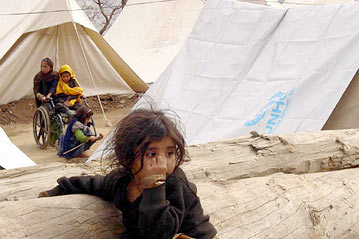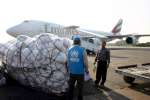Regular check-ups safeguard conditions in Pakistan's quake camps
News Stories, 7 February 2006

MUZAFFARABAD, Pakistan, 7 Feb (UNHCR) – Four months after it struck, nine-year-old Zaheda still carries the wounds inflicted by the earthquake which devastated large areas of northern Pakistan.
The physical damage is unmistakable. Zaheda has been confined to a wheelchair since both her legs were broken when her school in the hills of Pakistan-administered Kashmir collapsed. But her dark eyes also reveal less visible injuries; ones which may take longer to heal.
"Every day I recall the dreadful morning of the quake," she says as she clutches the hand of her younger sister. "I still hear the sounds of the school crashing on top of us, and I am so frightened it will happen again."
Zaheda, the oldest of five children, now lives with her family in the Al-Sufah camp near the city of Muzaffarabad. As lead agency for camp management, UNHCR is currently providing material and technical assistance to the Pakistan authorities and non-governmental organizations in 26 planned camps and 118 spontaneous camps hosting some 140,000 people in the earthquake-affected areas.
Spontaneous – or unplanned – camps such as Al-Sufah are frequently more crowded and less hygienic than camps set up by UNHCR and its partners. But residents are often unwilling to relocate.
Zaheda is among several patients being examined by a doctor brought to the camp by the UN refugee agency to assess residents' medical needs. The news for her is not good. The doctor, from a Turkish charitable organization, says Zaheda's broken bones have not healed properly and will have to be re-set.
Catherine Harding, UNHCR's Community Services Officer in Muzaffarabad, arranges for Zaheda to be taken to a nearby field hospital run by Cuban volunteers.
A middle-aged man then approaches the UNHCR team and in hushed tones, so as not be overheard by his neighbours, asks them to visit his father. During the quake, the 72-year-old man was struck in the back by a large boulder. Recently he has become incontinent. Embarrassed by the nature of the condition, his family has kept him hidden in their tent.
"We need to get your father out of the camp," Harding tells the younger man. "He'll be taken to the hospital together with Zaheda where he can be treated."
During the visit it's agreed with Al-Sufah's manager that several other vulnerable cases, among them an anaemic breast-feeding mother, will be relocated to camp nearby where conditions are more sanitary.
"We need to make sure we have contact with everyone," says Harding. "As we've seen, people with certain medical conditions may not want to talk about them. Others may not want to complain. With regular monitoring we can address issues before they become a problem."
As efforts to safeguard the well being of camp residents continue, planning has begun for the next stage of the operation – when families begin to return to their homes.
"The government of Pakistan has said camps should begin to close from the end of March," says Morgan Morris, UNHCR's Muzaffarabad coordinator. "So we are looking at ways to help people to restart their lives in their villages. The first step will be to provide them with information on conditions back home and on what further assistance they might be able to receive from the government or relief organizations."
By Maria Cierna in Muzaffarabad, Northern Pakistan





















































